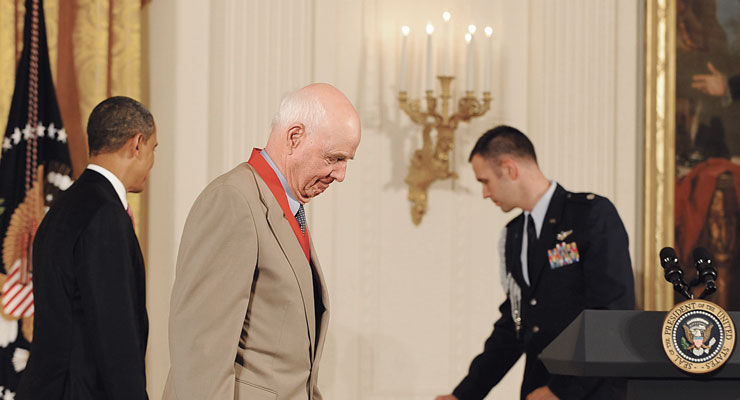Wendell Berry inducted into Writers Hall of Fame
President Obama awards a 2010 National Medal of Arts and National Humanities Medal to Wendell E. Berry for his achievements as a poet, novelist, farmer, and conservationist, in the East Room at the White House inWashington D.C., March 2, 2011. (Mary F. Calvert/MCT
January 29, 2015
By Sarah Brookbank
When Wendell Berry walked into the Carnegie Center on Wednesday night for his induction into the Kentucky Writer’s Hall of Fame, instead of taking the elevator to the second floor, he took the stairs.
Berry made his way through the room, smiling and shaking hands with colleagues and strangers alike. At 80 years old, Berry is the only living inductee into the Hall of Fame and joined the 18 other members who include authors from Kentucky’s 200 years of rich literary tradition.
“It would need a longer speech than I have for me to tell you what it means to me to be included in the company you have included me in,” Berry said.
Berry stressed the importance of Kentucky writers, the thriving culture and his worries about economic, social, cultural and institutional divisions.
“People and land cannot be destroyed or conserved except together,” Berry said.
Berry called for writers in the state to bring attention to community issues from a variety of aspects and stressed the need for writers to help sustain the culture of Kentucky.
“This occasion was very well done. I think Wendell was comfortable tonight among neighbors and friends and he spoke to us in that feeling,” said English professor Gurney Norman, who met Berry at UK and journeyed to the mountains of Kentucky with him in 1965 to see strip mining in action.
Journalism professor Al Cross also attended the speech, calling it a “tour de force.”
Cross said that Berry payed tribute to those who deserved it, while still talking about the value of the community and writing about those issues.
“We don’t have these public forums,” Cross said. “We need an entity that discusses and gets to the problem that Wendell mentioned, the intimacy between the state and wealthy interests.”
English junior Jonathan Sarfin said, “For me, being a Kentuckian is a difficult thing. There are a lot of stereotypes. We’re not known for our culture, but I found that his speech made me proud to be a Kentuckian and proud to be a Kentucky writer.
English sophomore Nathan Petrie waited after the speech for the book signing to add Wendell Berry’s signature to his collection of Kentucky poetry.
“I thought it was cool that he stepped aside from himself in almost a challenge to other writers to say, ‘You guys need to pick it up, not keep doing what I’m doing, just write,’” Petrie said. “That’s what I took from it.”



























































































































































